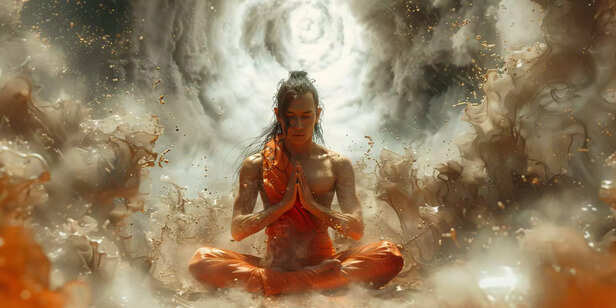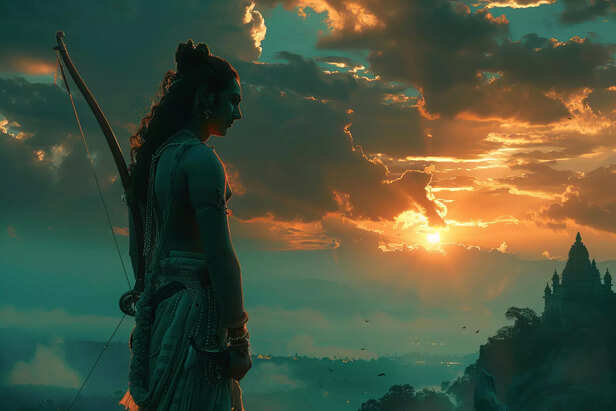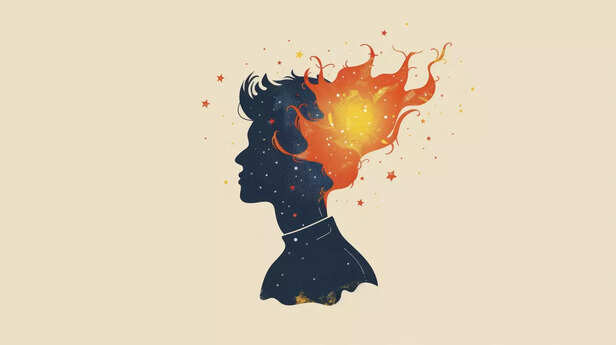What If The True Battle of Kali Yuga Is Within, Not Outside?
Amritansh Nayak | Sep 01, 2025, 15:31 IST
Kali Yuga Inner Battle
( Image credit : Freepik )
This essay investigates the premise that the main war of the Kali Yuga is within ourselves, not outside. It delves into inner demons, the mind's battleground, the fallacy of blaming society, and how personal awakening can result in true transformation and collective change.
Kali Yuga is commonly seen as a period of chaos, corruption, and exterior darkness. However, traditional wisdom advises that the most intense fights are fought not in the world around us, but within our own hearts and thoughts. Greed, wrath, ego, and fear silently shape society's demise. This article reimagines Kali Yuga as an inner battleground in which victory is dependent on self-awareness, moral discipline, and the awakening of divine strength inside.

When we think of Kali Yuga, we frequently envision a world riddled with corruption, conflict, and injustice—forces that appear to exist outside of us. However, the scriptures suggest a more subtle truth: the strongest foes of this age are not the mythological asuras of the past, but the inner demons that quietly dominate human behavior. Greed, wrath, envy, fear, and ego have become the unseen rulers of our thoughts, influencing decisions and distorting values. Greed pushes nations to exploit nature and accumulate wealth at the expense of compassion.
Anger fuels conflict in both personal relationships and international politics. Envy blinds us to thankfulness, whereas fear keeps us stuck in cycles of insecurity and mistrust. Above all, ego teaches us that we are separate, superior, or entitled, thus preventing us from experiencing empathy or knowledge. These inner demons are considerably more harmful than any exterior adversary because they poison us from within, making us complicit in the very darkness we denounce. The war of Kali Yuga is thus less about conquering nations and more about controlling the restless currents of the human heart. Only by confronting and defeating these inner demons will true serenity begin to show outward.
2.

Kurukshetra in the Mahabharata is commonly viewed as a historical war, but on a deeper level, it reflects the eternal conflict within the human mind. Every day, we fight an inner war that is similar to Arjuna's struggle between duty and despair. The new Kurukshetra is fought not with arrows and chariots, but with ideas, decisions, and intents. Every decision—whether to behave with integrity or compromise, forgive or punish, share or hoard—is a battle between dharma (higher principles) and adharma (lower impulses).
The whisper of conscience is frequently drowned out by the roar of want, much like Arjuna's insight was obscured by confusion and attachment. The true test of Kali Yuga occurs in these moments of doubt and temptation. Krishna's advice to Arjuna reminds us that clarity comes from combining action, wisdom, and detachment. In our lives, this entails developing awareness, self-discipline, and the fortitude to choose what elevates rather than lowers. The combat is not outdoors, but within the restless mind, and each of us is Arjuna, summoned to fight with knowledge, faith, and inner strength.

In the Kali Yuga, it is tempting to believe that the source of all pain is outside of ourselves. We reject corrupt systems, criticize politicians, and express dismay about the status of society. While these forces have an undeniable influence on the planet, they are not the only cause of darkness. The truth is even more disturbing: Kali Yuga survives solely when people allow inner discipline and morals to deteriorate. The outer world reflects countless interior universes. A dishonest leader rises because dishonesty is accepted in everyday life.
Individuals choose convenience over honesty, which leads to system corruption. Anger, racism, and intolerance continue to fester within people's hearts, escalating social confrontations. In this way, outside turmoil is only a magnified version of inner instability. Blaming the world is an illusion that keeps us from taking responsibility. True transformation begins with revolutions in character rather than in politics or institutions. If everyone tackles their own greed, pride, or fear, society as a whole begins to change. The Kali Yuga ends not with the defeat of evil outside, but with the awakening of virtue within.

Many people envisage the end of the Kali Yuga as a dramatic event, with Kalki arriving with a burning sword to kill evil and restore virtue. But what if the prophecy refers to an inner awakening rather than an external savior? Perhaps Kalki represents the greater consciousness within each of us, ready to emerge when we choose knowledge over ignorance, wisdom over confusion, and self-realization over ego. The war of this age is won not by destroying others, but by lighting oneself. When an individual overcomes wrath with patience, greed with contentment, and fear with courage, a quiet revolution occurs.
This inner victory spreads throughout families, communities, and finally societies. Collective transformation is simply the sum of countless personal transformations. In this way, the actual Kalki may already be present—hidden within each heart, waiting to be awakened. The "sword" is formed of truth and clarity, not steel, and it cuts through the delusions that tie us. Victory in the Kali Yuga is not dependent on divine intervention, but rather on realizing one's own divine strength. When enough people wake up, the age of darkness will naturally give way to the age of light.
The end of Kali Yuga may not come with an external rescuer, but rather through an internal revolt. Individuals who overcome greed, wrath, envy, and ego create a ripple effect of transformation. When enough hearts awaken, the darkness dissipates spontaneously. The true Kalki is the awakened self, who reminds us that the journey to a better age begins inside.
Explore the latest trends and tips in Health & Fitness, Spiritual, Travel, Life Hacks, Trending, Fashion & Beauty, and Relationships at Times Life!
1. Inner Demons of the Kali Yuga

Kali Yuga Inner Demons
( Image credit : Freepik )
When we think of Kali Yuga, we frequently envision a world riddled with corruption, conflict, and injustice—forces that appear to exist outside of us. However, the scriptures suggest a more subtle truth: the strongest foes of this age are not the mythological asuras of the past, but the inner demons that quietly dominate human behavior. Greed, wrath, envy, fear, and ego have become the unseen rulers of our thoughts, influencing decisions and distorting values. Greed pushes nations to exploit nature and accumulate wealth at the expense of compassion.
Anger fuels conflict in both personal relationships and international politics. Envy blinds us to thankfulness, whereas fear keeps us stuck in cycles of insecurity and mistrust. Above all, ego teaches us that we are separate, superior, or entitled, thus preventing us from experiencing empathy or knowledge. These inner demons are considerably more harmful than any exterior adversary because they poison us from within, making us complicit in the very darkness we denounce. The war of Kali Yuga is thus less about conquering nations and more about controlling the restless currents of the human heart. Only by confronting and defeating these inner demons will true serenity begin to show outward.
2. Mind as Battlefield

Mind Inner Battle
( Image credit : Freepik )
Kurukshetra in the Mahabharata is commonly viewed as a historical war, but on a deeper level, it reflects the eternal conflict within the human mind. Every day, we fight an inner war that is similar to Arjuna's struggle between duty and despair. The new Kurukshetra is fought not with arrows and chariots, but with ideas, decisions, and intents. Every decision—whether to behave with integrity or compromise, forgive or punish, share or hoard—is a battle between dharma (higher principles) and adharma (lower impulses).
The whisper of conscience is frequently drowned out by the roar of want, much like Arjuna's insight was obscured by confusion and attachment. The true test of Kali Yuga occurs in these moments of doubt and temptation. Krishna's advice to Arjuna reminds us that clarity comes from combining action, wisdom, and detachment. In our lives, this entails developing awareness, self-discipline, and the fortitude to choose what elevates rather than lowers. The combat is not outdoors, but within the restless mind, and each of us is Arjuna, summoned to fight with knowledge, faith, and inner strength.
3. Illusion of Blaming the World

Inner Reflection
( Image credit : Freepik )
In the Kali Yuga, it is tempting to believe that the source of all pain is outside of ourselves. We reject corrupt systems, criticize politicians, and express dismay about the status of society. While these forces have an undeniable influence on the planet, they are not the only cause of darkness. The truth is even more disturbing: Kali Yuga survives solely when people allow inner discipline and morals to deteriorate. The outer world reflects countless interior universes. A dishonest leader rises because dishonesty is accepted in everyday life.
Individuals choose convenience over honesty, which leads to system corruption. Anger, racism, and intolerance continue to fester within people's hearts, escalating social confrontations. In this way, outside turmoil is only a magnified version of inner instability. Blaming the world is an illusion that keeps us from taking responsibility. True transformation begins with revolutions in character rather than in politics or institutions. If everyone tackles their own greed, pride, or fear, society as a whole begins to change. The Kali Yuga ends not with the defeat of evil outside, but with the awakening of virtue within.
4. Victory via Inner Awakening

Kalki Inner Light Victory
( Image credit : Freepik )
Many people envisage the end of the Kali Yuga as a dramatic event, with Kalki arriving with a burning sword to kill evil and restore virtue. But what if the prophecy refers to an inner awakening rather than an external savior? Perhaps Kalki represents the greater consciousness within each of us, ready to emerge when we choose knowledge over ignorance, wisdom over confusion, and self-realization over ego. The war of this age is won not by destroying others, but by lighting oneself. When an individual overcomes wrath with patience, greed with contentment, and fear with courage, a quiet revolution occurs.
This inner victory spreads throughout families, communities, and finally societies. Collective transformation is simply the sum of countless personal transformations. In this way, the actual Kalki may already be present—hidden within each heart, waiting to be awakened. The "sword" is formed of truth and clarity, not steel, and it cuts through the delusions that tie us. Victory in the Kali Yuga is not dependent on divine intervention, but rather on realizing one's own divine strength. When enough people wake up, the age of darkness will naturally give way to the age of light.
Ultimately, this leads us to…
Explore the latest trends and tips in Health & Fitness, Spiritual, Travel, Life Hacks, Trending, Fashion & Beauty, and Relationships at Times Life!
